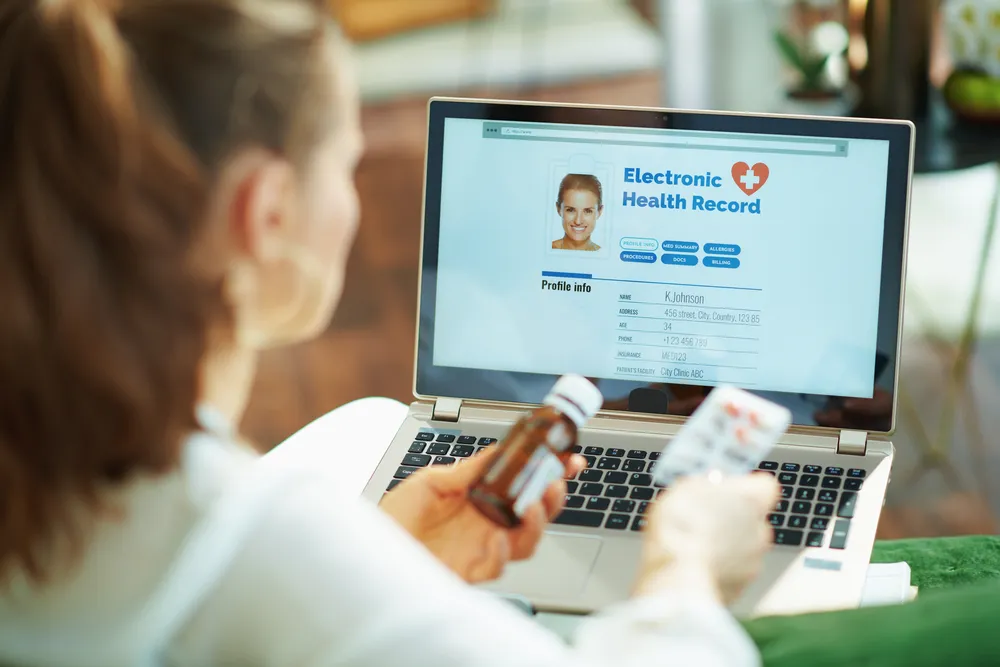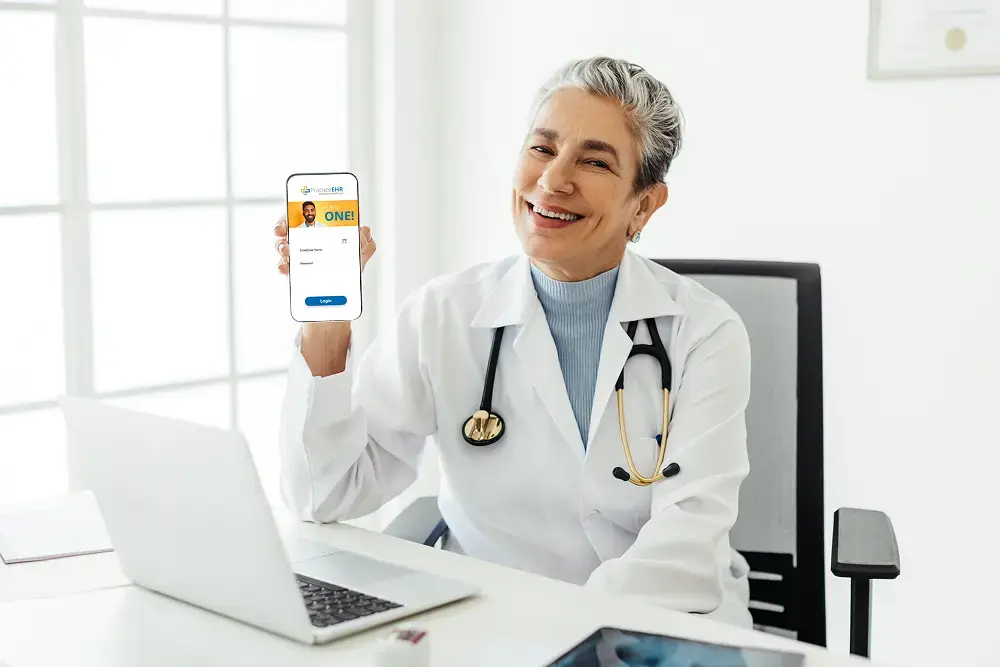From cameras to alarm clocks and phone books, everything you need is now on your smartphone. That’s because convenience is all that matters in the modern world. So why should managing your practice be any different?...
Healthcare administration associated with practice management translates into the exhaustion of valuable time and effort. A recent study concluded that workers in the United States spend time worth $21.6 billion each year dealing with healthcare administration tasks. This administrative burden poses a severe challenge for healthcare practices focusing on optimal patient care.
EHR software integration is a reliable approach to tackling the growing administrative workload in healthcare practice management. This method effectively addresses the challenges related to administrative tasks in the healthcare sector. Moreover, it enables healthcare professionals to allocate more time to their patients, emphasizing superior patient care.
Here, we discuss how practice management differs from EHR services and explore the benefits of a user-friendly EHR software integration to simplify practice management.

How is Practice Management Different from EHR?
Understanding the difference between practice management and EHR (Electronic Health Record) is crucial for optimizing healthcare operations. Practice management primarily involves running a healthcare setup's administrative and financial aspects. It encompasses appointment scheduling, billing, claims processing, and managing patient demographics.
On the other hand, EHR focuses on digitizing and organizing patient health records and clinical data. It provides a comprehensive digital version of a patient's paper chart, integrating data from various sources, including medical history, diagnoses, medications, treatment plans, immunization dates, allergies, radiology images, and laboratory test results.
While practice management deals with the business side of healthcare, EHR primarily concerns patient care and the clinical aspects of healthcare delivery. Practice management ensures smooth day-to-day operations, efficient billing, and revenue management. Meanwhile, EHR enhances patient care by providing a centralized, accessible repository of patient health information.
Practice management revolves around the efficient functioning of the healthcare facility, encompassing administrative and financial tasks. On the other hand, EHR centers on the organization and accessibility of patient health data. Essentially, it aims to streamline clinical processes and ultimately improve patient care.

How Does EHR Software Simplify Practice Management?
The integration of EHR software comes with multiple benefits, including seamless practice management. But exactly how does EHR software simplify practice management? What does user-friendly EHR software bring to the table for a healthcare setup? Let’s explore the benefits of EHR integration for practice management.
1. Improved Employee Efficiency
Implementing user-friendly EHR (Electronic Health Record) software can significantly enhance employee efficiency within a healthcare practice. The streamlined digital platform automates and simplifies numerous tasks that would otherwise require manual labor work. This includes appointment scheduling, billing, claims processing, and managing patient records. Thus, it allows the staff to dedicate their efforts to optimal patient care.
With EHR software, employees can promptly access and update patient information, eliminating the need for extensive paperwork and reducing the risk of errors. It centralizes all data, making it easy to navigate and input new information. And that’s how it breeds a more efficient workflow. Moreover, it minimizes the time spent searching for paper records, enhancing overall staff productivity.
Additionally, EHR systems often integrate features like automated reminders and notifications for upcoming appointments or follow-ups. This automation ensures that crucial tasks are not missed, keeping the staff organized and on track. Furthermore, It frees up mental space and time, allowing employees to dedicate their energy to delivering quality patient care.
2. Better Healthcare Outcomes
Adopting user-friendly EHR software can improve healthcare outcomes for patients and healthcare providers. EHRs facilitate seamless and organized access to a patient's complete medical history. Ultimately, it ensures healthcare professionals comprehensively view the patient's health profile. This comprehensive overview assists healthcare providers in making informed decisions and creating tailored treatment plans.
One of the crucial advantages of EHRs is improved accuracy and reduced errors in healthcare. Electronic records significantly minimize the possibility of manual errors often associated with paper-based systems. From prescription legibility to accurate dosages, EHRs help healthcare providers ensure patients receive the proper treatment regimen, enhancing patient safety and outcomes.
Moreover, EHRs often integrate clinical decision support tools that provide real-time alerts and reminders based on established medical guidelines. These prompts assist healthcare professionals in adhering to best practices. Thus, it improves diagnoses, suggests appropriate treatments, and prevents potential medical errors. What’s the result? Enhanced patient care and better health outcomes!
3. Enhanced Accessibility to Patient Health Information
Another way electronic health record software simplifies practice management is by enhancing accessibility to patient health information. With EHR systems, healthcare providers can access patient records instantly and securely, regardless of location. This accessibility ensures that critical health data is readily available. It thus prompts quicker decision-making and better patient care.
Additionally, patient health records within an EHR are organized in a structured and standardized manner. That way, it becomes easy for healthcare professionals to find and interpret the required information. This streamlined access saves time during patient consultations, allowing the healthcare team to focus more on providing quality care rather than searching through piles of paper records.
EHR software also allows for secure sharing of patient information among authorized healthcare providers. This feature is precious when patients receive care from multiple specialists or facilities. It ensures all parties can access the latest and most relevant health data. Thus, it leads to a more coordinated and comprehensive approach to patient care.
4. Streamlining Clinical Workflow
Opting for EHR software streamlines the clinical workflow within a healthcare practice. It eliminates manual paper-based processes, allowing healthcare professionals to enter, access, and update patient data electronically. This digitalization accelerates the clinical workflow by making information available instantly, enhancing the efficiency and accuracy of care delivery.
Moreover, EHR systems provide a centralized repository for patient records, consolidating medical information in one easily accessible location. This eliminates the tiresome task of sifting through paper files and folders. It ultimately saves valuable time for healthcare practitioners. Consequently, they can devote more time to direct patient care, improving patient satisfaction and outcomes.
Furthermore, EHR software often integrates with diagnostic devices and labs, allowing for seamless test results communication between healthcare providers. This integration minimizes delays in diagnosis and treatment, ensuring that healthcare providers make timely decisions based on updated information. Thus, it fosters a more efficient clinical workflow and promotes a proactive approach to optimal patient care.
5. Enhanced Coordination Between Healthcare Providers
Yet another benefit of electronic health record software is that it significantly enhances coordination between healthcare providers within a practice. This digital platform allows healthcare professionals to access and update patient information in real-time, promoting seamless collaboration.
With EHRs, various healthcare providers involved in a patient's care can share information, including diagnoses, medications, and test results. This real-time sharing ensures that team members are well-informed, contributing to a more cohesive and coordinated approach to patient care. Thus, it's a significant step towards providing holistic and integrated healthcare services.
Moreover, EHRs often offer features like secure messaging and alerts, allowing immediate communication and notifications among healthcare providers. Whether discussing a patient's condition or coordinating treatment plans, such features facilitate quick decision-making. Most importantly, an intuitive EHR system ensures all parties are on the same page. Let’s put it this way: Effective communication enhances patient care and satisfaction.
Practice EHR - Intuitive Software Transforming Practice Management!
Practice EHR brings a practice’s office management under the scope of its resourceful and user-friendly EHR software. From an integrated PM and clearinghouse to a patient portal, the many features of Practice EHR make it stand out. Moreover, onboarding a new EHR system has never been easy because our highly cooperative team assists you at every step of the process.
REQUEST A DEMO today and explore how you can simplify your practice office management with our user-friendly EHR software!
Topics: Patient Care, EHR Solution, New Technology, Medical Billing, EHR, Practice Management Software, Simplify Practice Management
RECENT POSTS



TOPICS
- EHR Solution (147)
- EHR (84)
- Patient Care (77)
- digital age (77)
- Medical Billing (72)
- Specialty-Specific EHR (70)
- Integrated EHR (59)
- Small Practice (56)
- Technology in Healthcare (55)
- Industry Update (50)
- New Technology (47)
- Medical billing services (45)
- RCM (43)
- EHR Features (42)
- Cloud-based EHR (39)
- Practice EHR News (39)
- Healthcare Office Management (37)
- Kiosk (28)
- ePrescribing (21)
- HIPAA Security (20)
- Telemedicine (14)
- EMR (12)
- Revenue Cycle Management (12)
- Practice Management Software (11)
- Client Favorites (10)
- Practice Automation (10)
- The ONE (10)
- Urgent Care (8)
- MACRA/MIPS (7)
- Patient Portal (7)
- Switching to New EHR (6)
- events (6)
- E-Prescribing (5)
- Product Updates (5)
- TeleVisit (5)
- AI Solutions (4)
- Insider (4)
- Internal Medicine EHR (4)
- MIPS (4)
- Podiatry (4)
- Podiatry EHR (4)
- AI Scribing (3)
- HIPAA (3)
- MIPS Reporting (3)
- Regulatory Updates (3)
- AI scanning (2)
- Billing for Private Practices (2)
- Clearinghouse (2)
- Dermatology EHR (2)
- EHR Scheduling (2)
- Foot and Ankle Care (2)
- Foot and Ankle EHR (2)
- Health records 101 (2)
- Integrated Practice Management (2)
- Medical Credentialing (2)
- Medical Practice Management Software (2)
- Orthopedics EHR (2)
- Patient Check-in Kiosk (2)
- Psychiatry EHR (2)
- Quality of Patient Care (2)
- Reporting Under MIPS (2)
- Risk and Liability in Medical Settings (2)
- Telehealth Platform (2)
- Telehealth Platforms (2)
- What Works Clearinghouse (2)
- AI-powered Medical Billing (1)
- Bariatric EHR (1)
- Behavioral Health Practices (1)
- Billing Communication (1)
- Cardiology EHR (1)
- Cash Flow (1)
- Chiropractic EHR (1)
- Data Security (1)
- Dos and Don'ts (1)
- EHR Guides (1)
- EHR KPIs (1)
- EHR Questions to Ask (1)
- EHR for Chiropractors (1)
- EHR for Chronic Illness (1)
- EMR vs EHR Difference (1)
- ENT EHR (1)
- Eligibility Verification in Medical Billing (1)
- Endocrinology EHR (1)
- Family Medicine (1)
- Family Medicine EHR (1)
- Gastroenterology (1)
- Gastroenterology EHR (1)
- General Surgery EHR (1)
- Geriatrics EHR (1)
- Guides (1)
- Healthcare Compliance Certification (1)
- Healthcare Practice Office Management (1)
- Help Center Videos (1)
- Insurance Reimbursement (1)
- KPI (1)
- Key Performance Indicators (1)
- Lab Processing (1)
- MACRA (1)
- Medical Billing Partner (1)
- Medical Coding Services (1)
- Mobile EHR (1)
- Nephrology EHR (1)
- Neurology EHR (1)
- Pain Management EHR (1)
- Pediatrics EHR (1)
- Physical Therapy EHR (1)
- Practice Cash Flow (1)
- PracticeEHR GO App (1)
- Pulmonology EHR (1)
- Simplify Practice Management (1)
- Staffing in Healthcare (1)
- Switch Medical Billing Providers (1)
- Urgent Care Medical Billing (1)
- Urology EHR (1)
- insurance claim denials (1)







